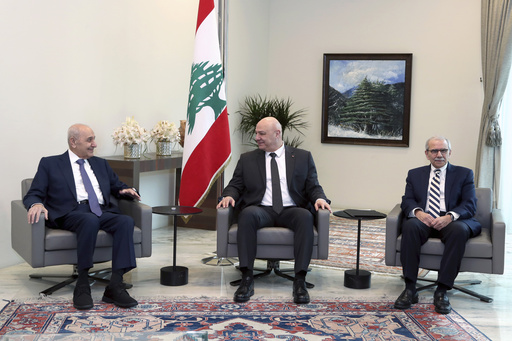BEIRUT — Lebanon has officially established its first fully functioning government since 2022, as Prime Minister Nawaf Salam announced the formation on Saturday.
President Joseph Aoun, in a formal statement, disclosed that he had approved the resignation of the previous caretaker cabinet and, alongside the new Prime Minister, signed the decree to establish the new government.
In his address, Salam emphasized his commitment to rebuilding trust among citizens and their government, as well as improving relations with Arab nations and the global community. He underscored the necessity of reforms designed to extract Lebanon from a prolonged economic downturn. Salam declared, “Reform is the only path to a true salvation.”
The Prime Minister also expressed his intention to ensure that the ceasefire agreement, which concluded the recent conflict between Israel and the Lebanese militant organization Hezbollah in late November, is duly implemented. He affirmed his objective to guarantee complete withdrawal of Israeli forces from Lebanon and vowed to oversee reconstruction efforts in areas that suffered devastation during the war.
The newly formed cabinet comprises 24 ministers, evenly divided between Christian and Muslim factions, and was put together less than a month after Salam’s appointment. This development comes at a critical juncture as Lebanon seeks to rebuild its war-torn southern region and maintain security along its borders.
Lebanon is grappling with a severe economic crisis that has persisted for six years, severely impacting its banking system, crippling the electricity sector, and plunging many citizens into poverty without access to their savings.
Salam, who previously held a diplomatic role and served as the president of the International Court of Justice, has pledged to initiate reforms targeting Lebanon’s judiciary and struggling economy to instill stability in a country that has faced ongoing challenges across political, economic, and security dimensions for many years.
The new governmental structure represents a departure from previous leadership closely associated with Hezbollah, indicating Lebanon’s intention to strengthen ties with Saudi Arabia and other Gulf states that have expressed concern over Hezbollah’s increasing political and military influence in recent years.
In January, Aoun, a former army chief and not affiliated with Hezbollah or its key allies, was elected president, thereby ending an extended power vacuum in that position.
Sharing similar views with Salam, Aoun has also committed to reinforcing the government’s right to control weapons in Lebanon, a clear reference to Hezbollah’s armament.
Despite the government’s formation being perceived as a potential turning point towards stability, Lebanon continues to face security challenges on multiple fronts.
Earlier this week, clashes broke out on the eastern border with Syria involving Lebanese clans and the forces of the newly installed Syrian government, primarily made up of ex-members of Islamist militant groups. The historically porous border has facilitated smuggling operations involving people, weapons, and narcotics. Syrian authorities reported that their security personnel are intensifying efforts to dismantle smuggling networks.
On Saturday, the Lebanese army stated that several areas in Lebanon had come under fire from Syria, prompting orders for troops in the border regions to respond to fire originating from Syrian territory.
In a related incident, six individuals lost their lives, and two more were wounded due to an Israeli drone strike in the Janata area, close to the Syrian border, as reported by the state-run National News Agency. The Israeli military claimed that the attack targeted operatives of Hezbollah engaged in activities related to weapon manufacturing and storage facilities belonging to the group.
Israel has sustained nearly daily strikes against what it identifies as Hezbollah installations within Lebanon since the ceasefire was established. This agreement allows both Israel and Lebanon the right to self-defense, although it does not specify the criteria for what constitutes an act of self-defense.
Although the initial 60-day implementation period for the ceasefire terms lapsed in late January, Lebanon and Israel have consented to extend the deadline until February 18.
This website uses cookies so that we can provide you with the best user experience possible. Cookie information is stored in your browser and performs functions such as recognising you when you return to our website and helping our team to understand which sections of the website you find most interesting and useful.
